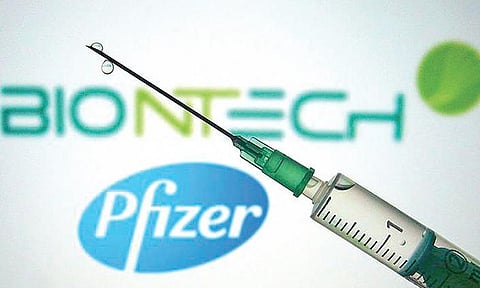

NEW DELHI: The government’s attempt to bring Pfizer’s much-acclaimed Covid-19 vaccine to India has so far been scuppered by the US pharmaceutical giant’s insistence on granting indemnity. Indemnity is a legal bond that protects vaccine makers from being sued if a recipient suffers grievous side effects.
For the American drug manufacturer, indemnity is learnt to be non-negotiable. This is not surprising because even without the indemnity, Pfizer and all other vaccine producers enjoy a huge amount of protection against any legal liability in the US and European countries, something these companies will not have if India does not grant indemnity. The protection stems mainly from four privileges drug manufacturers enjoy.
Law against injuries
In 1986, the US Congress during the Reagan administration passed the National Childhood Vaccine Injury Act. The law protects vaccine manufacturers from any financial liability on account of an adverse event following immunization, or vaccine injury in their parlance.
The law was passed in the backdrop of an increase in lawsuits being filed in state courts of the US against producers of the DPT vaccine (diphtheria-pertussis-tetanus). Many Americans feared, perhaps unfoundedly, that the vaccine was causing brain damage. The lawsuits resulted not only in protracted battles in the courts but slowed the production of the vaccines and resulting in DPT vaccine prices skyrocketing.
Compensation fund
Under the NCVIA, the National Vaccine Injury Compensation Program was started. The VICP provides for compensation to people found to have developed side effects owing to vaccines. This compensation fund was already in existence in the United Kingdom and it was later replicated by other European countries.
In the UK, where indemnity has been granted to Pfizer, the government has added Covid shots to the already existing Vaccine Damage Payments Scheme wherein a one-time payment is given to individuals left disabled by vaccine side-effects.
There is, however, an upper limit of £1,20 000 on awards and so amounts are lower than damages awarded by courts. Similarly in the US, a compensation fund is created by a cess, which ranges from $0.75 to $4.50 on each vaccine dose which may cost anything from $12-220 per dose.
In India there is no such compensation system, making Pfizer and other vaccine makers to fear lengthy legal battles that may take at least 10-12 years before compensation is awarded. This too is subject to appeal in higher courts.
US top court ruling
In a far-reaching judgment in 2013 in a case between Mutual Pharmaceutical Company and Karen L Bartlett of New Hampshire, the US Supreme Court held that generic drug manufacturers cannot be held liable under any state law. Bartlett sued the company arguing that the drug for shoulder pain caused her to develop side effects.
The top court ruled that only federal courts can decide such matters. “This ruling bars court cases against drug companies, which is not there in India,” said Deepshikha Malhotra, a lawyer.
Class action suit
Drug manufacturers in advanced countries also benefit from the imperatives of class action suits against any wrongdoing by a company. A class action suit is a legal case filed by more than one individual to seek damages.
“But a class action suit has many limitations for vaccine recipients and is loaded in favour of drug companies. Firstly, there has to be at least 50 of them seeking damages and secondly, they should have faced the same or similar side effects from the vaccine,” said Malhotra.
India’s massive population could also be balking Pfizer and the others. According to Supreme Court lawyer K V Dhananjay, “the more the population the more ye likelihood of liability towards victims of vaccine harm.”
“As such, Pfizer might be concerned about the exposure to such a large Indian market. If the government badly wants Pfizer to augment vaccine supplies to India, it may very well think about indemnifying it,” he said.
The speed with which the Covid vaccines have been developed worldwide is why all manufacturers are seeking indemnity. “Previously all the vaccines that were launched were rolled out only after 3-4 years of trials, but Covid vaccines were available in a few months only. So some risk factor is always there,” said advocate Ankur Raheja.
Shreya Jha, an AIIMS doctor also said had more time been given to vaccine manufacturers for their rollout, such indemnity clauses would not be mandatory.